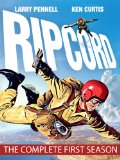| Reviews & Columns |
|
Reviews DVD TV on DVD Blu-ray 4K UHD International DVDs In Theaters Reviews by Studio Video Games Features Collector Series DVDs Easter Egg Database Interviews DVD Talk Radio Feature Articles Columns Anime Talk DVD Savant Horror DVDs The M.O.D. Squad Art House HD Talk Silent DVD
|
DVD Talk Forum |
|
|
| Resources |
|
DVD Price Search Customer Service #'s RCE Info Links |
|
Columns
|
|
|
Ripcord: Complete Season 1
"This is the most danger-packed show on television. Every jump, every aerial maneuver is real, photographed just as it happened, without tricks or illusion. All that stands between a jumper and death...is his ripcord."
"This is skydiving: controlled flight without wings. Even for experts, the most dangerous game going. This jump, like every jump you will see on this series, is being made by a highly trained man who is playing the game for the highest stakes that there are: his own life. He has one and only one safety device at his command: his parachute and its ripcord."
Last-stage Ziv "armpit slick," cleaned up for the kids by Ivan Tors. TGG and M-G-M have released Ripcord: Complete Season 1, a boxed 2-volume, 5-disc, 38-episode collection of the Ziv-United Artists syndicated actioner's 1961-1962 season. Starring Larry "Dash Riprock" Pennell and Ken "Festus" Curtis as skydiving buccaneers/private detectives/secret agents/emergency medical personnel/Good Samaritans Ted McKeever and Jim Buckley, Ripcord's combination of pasteurized men's adventure magazine storylines (in other words: no sex) and some then-spectacular early skydiving footage, made it a marginal hit with families and particularly young viewers in the dying days of 1960s first-run syndication. Ripcord's plotlines at times may seem a tad outlandish today; however, the scripting is almost hypnotically succinct and to the point, the production polished (particularly for a low-budget entry), and the performances fine, with many familiar faces popping up this season in guest roles. No extras for these just-okay fullscreen black and white transfers.
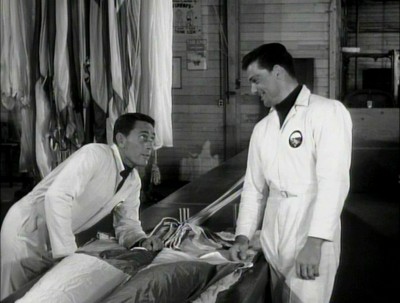
Ripcord's set-up is fairly straightforward, week after week: it always ends with someone jumping out of a plane. Handsome, head-strong skydiver Ted McKeever (Larry Pennell), and his older, level-headed mentor, Jim Buckley (Ken Curtis), run Ripcord, Inc., a skydiving-for-hire outfit based in Southern California. Ted and Jim, veteran USAF jumpers from the Korean War, will drop out of the skies for anyone who has the necessary scratch. If an inaccessible mining camp needs new drill bits now, it's time to hit the silk. If a doctor at an inaccessible ski lodge needs some delicate instruments pronto, well, then..."Geronimo!" If a little girl is lost on an inaccessible mountain top, then it's time to pull the ripcord. Ripcord, Inc. also trains amateur skydivers--a constant source of trouble, considering the recruits always turn out to have either ulterior motives (usually criminal), or personality disorders that demand they pull some stupid stunt that endangers Jim and Ted (another pesky problem: invariably wherever Jim and Ted land an armed fugitive seems to be waiting..). Since Ted and Jim can't very well fly their own plane (those things tend to crash when both passengers jump out), Ripcord, Inc. employs a pilot: first wisecracking hotshot Chuck Lambert (Paul Comi), then wisecracking older pro Charlie Kern (Shug Fisher).
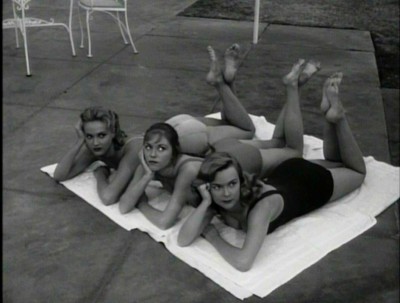
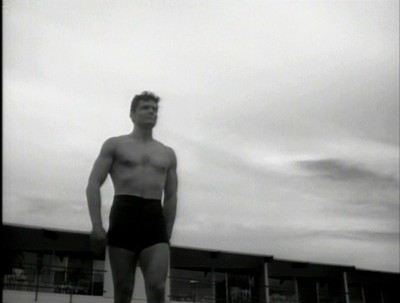
Having seen Ripcord's title pop up over the years, the name rang a small bell when I saw it in our screener pool. However, I'm pretty sure I had never watched an episode prior to this release. While a few top-tier "golden age" first-run syndicated outings like Highway Patrol and Sea Hunt still rotated heavily in my TV area when I was growing up, Ripcord either passed our market by...or was long-gone by the early 70s. Ziv Television Programs, Inc., the producer of the above two classic titles, among many others, and at one time the king of first-run TV syndication in the early 1950s, was by Ripcord's 1961 premiere date a company on the way out. When successful radio syndicator Frederick Ziv found out he could make even more money selling TV shows directly to content-hungry stations, he quickly amassed a fortune churning out easily-programmed half-hour action/adventure series like 1949's The Cisco Kid, 1953's I Led Three Lives, 1951's Boston Blackie, and Highway Patrol, the last debuting at the height of independent producer Ziv's influence and power, in 1955. Unfortunately, the immediate, massive success of Ziv Television Programs, Inc. got the "Big Three" thinking about syndicating their own product "off network" (in other words: reruns of their old shows no longer running in prime time), an evolution that swiftly eliminated Ziv's market (why would advertisers and stations risk money on new, unproven shows, when audiences were already primed to watch reruns of their old favorites at comparatively lower prices than the new indies?). Production began to dry up for the independent syndicators almost immediately, before some started to provide product for the increasingly powerful networks, as Ziv did in 1956. By 1959, Frederick Ziv, once his own boss but now little more than an independent contractor subject to the strictures (and whims) of his biggest buyers, the networks, sold Ziv Television Programs, Inc. to United Artists (the worst performer among the Hollywood movie studios in terms of producing hit television programming), eventually leaving the board of directors of the new Ziv-United Artists Television company (the producer of Ripcord), when UA fully absorbed Ziv and dropped his name from the company in 1962.
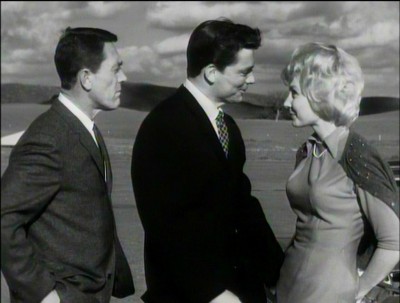
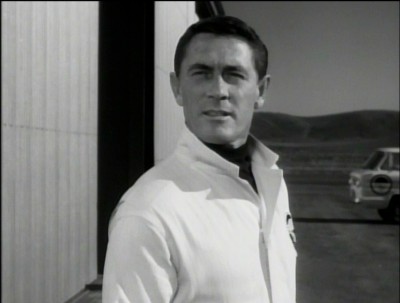
Mixing in elements of other adventure outings like Sky King, Whirlybirds, The Aquanauts, and Sea Hunt, Ripcord was developed--according to what I've gleaned on the net--by real-life jumpers Jim Hall and Dave Burt, whose Para Ventures parachute company somehow came to the attention of Ivan Tors' production company (the missed jump off the bow of a producer's yacht sounds like P.R., but who knows? It's Hollywood....). A premise was fashioned around the exciting adventures of two wisecrackin' ex-servicemen buddies, now professional parachuters living the So-Cal good life without answering to nobody, who jumped into dangerous situations week after week (sounds like it came right of Argosy or For Men Only)--only with the more sensational elements of those similar stories found in the pulp "sweats" eliminated for mainstream kiddie/family broadcast (we do get a crazed Nazi this season, and a deadly animal-infested jungle...but no sex-mad gorillas, WWII Japanese sex torturers, or UFO sightings). However popular Ripcord was with the general public at the time, or what kind of a lasting impact it has since achieved in the expansive landscape of 60s television popular culture, is open for debate (actually, it's not--the series is largely forgotten in that broader context). Apparently, though, the show was responsible for furthering the appeal of the then-new sport (it's said that quite a few people who later became influential in parachuting had grown up on the show), as well as for creating a toy--much imitated and knocked-off over the decades for kids like myself who didn't know about any connection to a TV series--that everyone used to have: the large, plastic Army guy attached to a bright, colorful parachute.
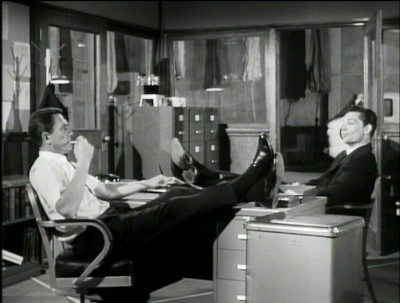
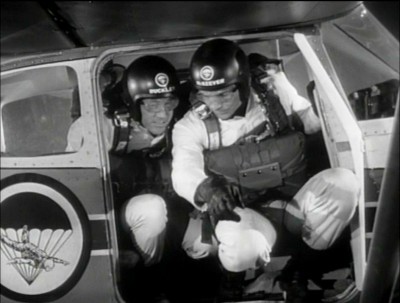
The series' opener, The Sky Diver, scripted by Arthur Weiss and directed by Alexander Singer, is an excellent example of Ripcord's sanitized men's adventure magazine vibe: Ted and Jim have to drop supplies for prospectors in Mexico's treacherous and inaccessible Sierra Madre mountains. In a rare (and quite amusing) display of adult sexuality for the series, a swimsuit-clad Ted is seriously ogled by three beautiful girls at the country club (their naked, disinterested lust for beefcake Ted feels quite modern), before he's beating in some prospector's brains at a rustic trading post (excellent shaky, hand-held P.O.V. camerawork here). Like a tight, concise one page short story in Real or True, The Sky Diver sets the pace for the rest of the season. Scripter Vance Skarstedt comes up with a enjoyable little noir rip-off of The Tarnished Angels in Air Carnival, where sexy The House on Haunted Hill's Carol Ohmart is willing to risk everyone's life to get the boys to join her air carnival. Future best-selling author James Cavell directs cleanly and efficiently here. Unrepentant at the end, Ohmart sneers to morally uptight Ted, "My way of living is better, " to which he responds, "And shorter." She tops him with a smile and a nihilistic, "Who cares?" Nice. E.M. Parsons scripts Airborne, about three rich punks menacing little spitfire Susan Silo, who just wants to learn how to jump. Soon head j.d. Pat DeSimone is training, too, through the miracle societal curative: calisthenics (Jim tried to warn Ted: "Kids do some funny stuff these days...."). Vernon E. Clark's Chuting Stars has world's worst actor John Agar corralling his Navy "Shooting Stars" buddies to help find a kidnapped girl--who's diabetic, naturally--trapped on an inaccessible mountain...with a storm moving in, for good measure. Regular series contributor Stanley H. Silverstone gets a novel twist with Colorado Jump, where Ripcord, Inc. has agreed to participate in a publicity stunt for teenybopper singer Ty Whitney. When it goes horribly wrong, his manager, Jean Carson ("Helloooo, doll!"), couldn't care less. Joanne Court pens an excellent, slightly creepy little mystery, The Condemned, where Ted and Jim try and help death row inmate Michael Pataki by chuting into the remote ski lodge to try and find his missing wife. Their reception is right out of Bad Day at Black Rock, with Sarah Selby and Denver Pyle adding color as the victim's quite mad mother and father. Spectacular location work here, marred by an irritating frame-jumping transfer, unfortunately. Well-directed by James Clavell.
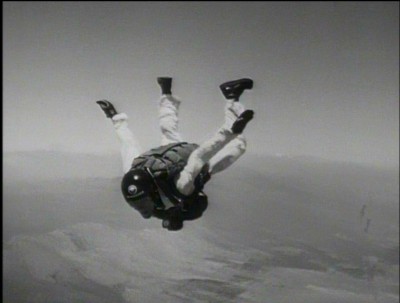
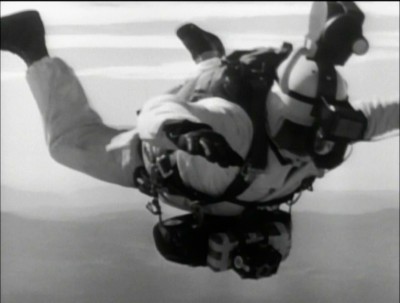
Frank Granville's Counter-Attack stays too long on the ground as the boys play secret agents, skulking around a lonely suburban mall (I wonder how built up that clean, deserted area is now...). Frankly, the best part of the episode was the few frames of the "Place Commercial Here" bumper accidentally left in. Cannon's William Conrad directs the snappy Crime Jump, from Richard Adams, where "The Assassin," Burt Reynolds, infiltrates an industrial complex. Former big star Richard Arlen shows up (to good advantage), before a big mid-air parachute fight (pretty cool) and a sky hook snatch (remarkable). Harry Townes does his usual wormy shtick in DARB (a.k.a. Dangerous Night), as an unscrupulous archeologist who kidnaps Ted when the skydiver won't help him smuggle precious Mexican artifacts. Another forgotten performer, Biff Elliott, shows up in Death Camp, playing a former baseball player turned fugitive, on the run, with Ted in tow. E.M. Parsons supplies the punchy script. Derelict, from Robert Smith, has a more direct "armpit slick" feel, as the boys land on a deserted ship and clash with salvage skipper Alan Baxter. The cargo? TNT and nitro. Commies are hinted at in Top Secret, from Stanley H. Silverstone, when FBI agent Robert Clarke fears his scientist father Paul Birch is going over to "the common cause." Too much spying and too little flying for this one. Much better--if highly improbable--is Radar Rescue, where washed-out skydiving student John Considine (always good playing a slime ball), a radar operator for a B-52, guides the boys down through the soup like they're a couple of 10 megaton bombs, for a dire rescue mission. James Hall and Stanley Silverstone wrote it. Supporting player Paul Comi gets his own episode (sorta) in Sierra Jump, where he's on trial with the FAA. The charge? Taking goofballs and flying, resulting in the death of a famous author. The episode then neatly switches to a little noir crime meller.
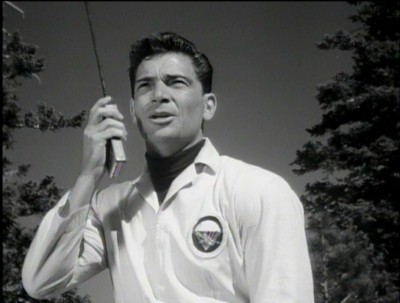
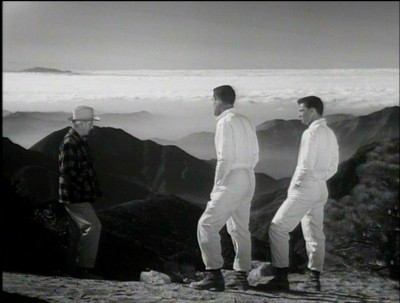
William Conrad is back at the helm for The Silver Cord, from Mann Rubin, where sensitive, intelligent kid Jack Chaplain gets slapped around by his domineering father, Robert F. Simon (Simon, never so nasty, seems to be enjoying wholloping that kid, yelling, "Come on! Come on! Come on! Show me you're a man!"). The tables are turned, though, when father depends on son to save his ass (nice mechanics at the end, when the kid pulleys his father up a cliff...while the Air Force is bombing the valley!). Harold Shumate's Thoroughbred finds cowed husband Lee Van Cleef (yep...he's a pussy here) taking guff off his pushy wife, Doris Dowling, who cares more about their champion, Matador, than him. Skydiving is pretty incidental to this one, unfortunately. Much more flying in Ransom Drop, where the boys have to drop highly sensitive equipment--"government stuff," we're helpfully told--as ransom for a kidnapped electronics expert. That DARB ("Distressed Airman Rescue Beacon") gadget is a good gimmick for the show, often used...but the most memorable element here is Paul Comi's ham-handed overacting when the villains shoot up his plane (is this the episode where the producers decided to drop him? Possible...). Escape, from Stanley H. Silverstone, is a tricky outing where Comi--much better here--has to outwit escaped con Lane Bradford (even though he knows his escape was futile, Bradford insists it was worth it: parachuting was the first time he "ever felt really free, "). Double Drop finds Ziv-UA star James Coburn, of Klondike and Acapulco fame at this point in his career, presenting an agreeably nasty, smart-assed turn as a kidnapper in need of medical supplies for one of his henchman (of course they're stuck on an inaccessible mountain...). Coburn should have stayed a villain on the big and small screen (much more interesting). Lee Erwin's The Financier is an entertaining little noir mystery, with Russ Conway pulling some insurance fraud shenanigans...until things get out of hand with partner Myron Healey. Ripcord's strongest tie-in with the men's adventure magazine culture comes with Sentence of Death, where the boys, all set to sky/scuba dive for sunken treasure (check), land on the wrong boat, where Israeli agents (although they're not identified as so) Gerald Mohr and Lisa Gaye have kidnapped none other than Adolph Eichmann's personal aide, Philip Ober (check). You get everything you could want in an adventure story here, in Robert Smith's hypnotically concise scripting.
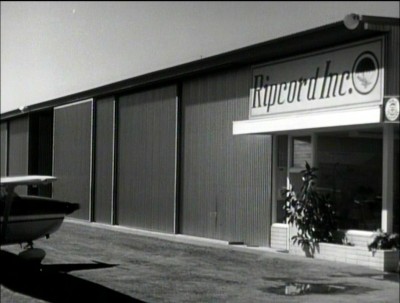
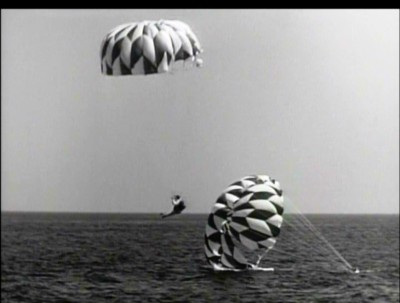
Teddi Sherman has a nice twist in the familiar Desperate Choice: of course there's a little girl lost on an inaccessible mountain...but she's trapped in a collapsed mine. And even better: her father spots a weasely-looking guy (I swear the producers picked him because he looks like Lenin) and decides on the spot he's the pervert kidnapper and he's going to kill him (I know it's not supposed to be funny...but I couldn't help cracking up as the hapless college professor whined and squirmed uncontrollably--almost as amusing as the blase father getting off scot-free). Don Archer's Desperate Choice only registered with me twice: a pretty cool machete fight with Jim, and the brief presence of suave, silver-haired Richard Simmons, of Sergeant Preston of the Yukon fame. Everything else was typically dull Central American intrigue filler. Even though Shug Fisher's pilot, Charlie Kern, has been seen in previous episodes (shown out of production order, obviously), this is his introductory outing: Hagen Charm, from Lee Erwin. A surprisingly involving entry where football/war/medical "hero" Dr. Arthur Franz (underrated, and always good), confesses he's a coward--he can't jump and save his dying son because he's lost the family lucky charm: "The Spanish Stone." Fisher, a fellow Sons of the Pioneers band member with Ken Curtis, is a lot of fun as the cranky pilot, Charlie Kern ("I can whip any man in this room!" is the scrawny Fisher's entrance line--perfect). Vernon E. Clark's The Helicopter Chase is an amusing entry (made even funnier when thinking about today's technology): important documents, lost on an inaccessible mountain top (what else) must be read by Ted over the DARB, while airborne stenographer Dyan Cannon (perky, as usual, and nicely flip) transcribes them, hopefully in time to avoid a rival company's contract bid. Priceless. Jungle Survivor, from A.M. Zweibakch, seems like it was the series' pilot episode, with Ted's narration asking us to give the show a try ("Give us a ring,"). A through and through men's adventure magazine storyline, with the boys stuck in a bug-infested, alligator-crammed jungle, the always joshing, bantering Ted and Jim are at each other's throats here...and I like that bit of unexpected grit.
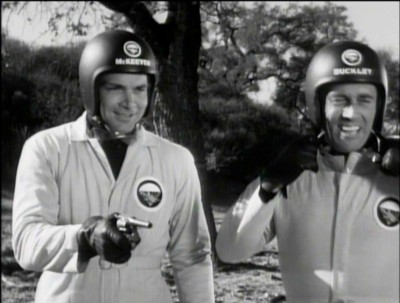
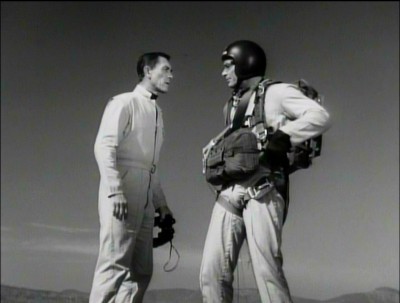
Yet another smart-assed student and a waiting gunman on the ground populate the too-familiar High Jeopardy, while the much better Hi-Jack, from Sam Cobb, sports a hijacked plane full of scientists made to jump out of a plane (a stunt worthy of a Bond movie highlights this tense outing: Ted pushes Whit Bissell out of the plane without a parachute, only to rescue him seconds later). Future TV biggie Stephen Kandel scripts The Human Kind, another tense outing about a Reverend (Kenneth Tobey) trying very hard not to kill insane punk Paul Lambert (creepily over the top, thankfully). Lee Erwin's amusing Hurricane Charley is a good vehicle for Shug Fisher, whose bunion tells him bad weather is coming in a clear blue sky. Stuart Jerome's Elegy for a Hero is a familiar but well done story about big shot Lang Jeffries turning out to be not quite so big when it comes to his cheating wife. P.K. Palmer's Cougar Mesa storyline about insurance fraud is also recognizable, but well done here with a solid supporting cast. Last Chance is a tight little suspenser as a wounded Ted, with the aid of old coot prospector Hank Patterson, tries to elude killer claim jumpers in a deserted ghost town. Probably the most incredulous entry this season, Stanley Silverstone's Log Jam, winds up with Jim trying to catch a dropping, chuted box of unrefrigerated nitro glycerin, in order to blow up a camp's log jam (my youngest son asked how did the loggers get up there, if the skydivers can only hit the silk to deliver the goods. I congratulated him on being smarter than the screenwriter).
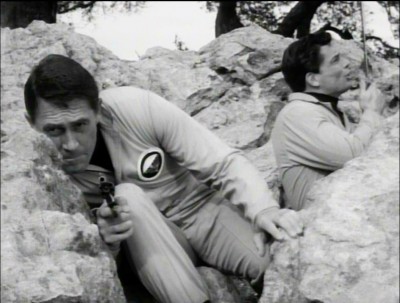
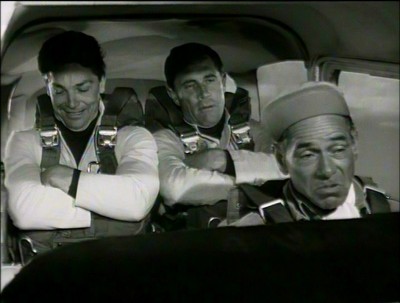
No, Mile High Triangle from Robert Warnes Leach and Stanley Silverstone is not a love story between Jim, Ted and Charlie, but rather a solid little noir outing where sniveling Robert Sampson decides to off his lovely wife, Kathie Browne (cute), to pay off his gambling debts. Excellent chuting in this one. One of the season's best outings, Millionaire Doctor, from John Meredyth Lucas, finds cold, ruthless father George Macready (so good doing this kind of character) forcing his hated son-in-law, former parachuter and doctor Lee Philips to chute in and save Macready's stupid joyboy son, who's driven off a cliff. When Macready offers Ripcord, Inc. any amount of money to go in and save the boy, his girl, and a now-injured Philips (who cracked up on landing), Ted calmly offers, "Your money's a pretty good argument...almost as much as those three people down there," (unlike most services rendered by TV private eyes, doctors, and other professionals, Ted and Jim are often shown getting paid...which they like). The climatic scene involves Jim, a former paramedic, performing delicate arterial surgery via woozy Philips' nodding-off instructions (oddly enough, heart surgery via unskilled parachutist is now mandatory under Obamacare...). One for the Money, from Frank Granville and Daniel P. Harmon, keeps the ball rolling with an excellent noir outing when Ted finds himself trapped on an inaccessible mountain with a ruthless gang, headed up by Johnny Seven. Lots of fun tough-guy insults thrown around, with good performances, too (watch for unsettling Steve Inhat in a small role). Finally, the season closes up with Para-Nurse, from E.M. Parsons, where the boys meet their match in wise-crackin' ball breaker chuting nurse Allison Hayes, who must be dropped on an inaccessible mountain top (I know, I know...) to help Harry Carey, Jr.'s dying son. Certainly the show's most dangerous stunt (or at least it seemed so to me) is saved for last: a freefall in the pitch-black night, with only hand-held flares to light the way down as Ted hurtles towards the unseen ground. Very cool, with eerie photography.
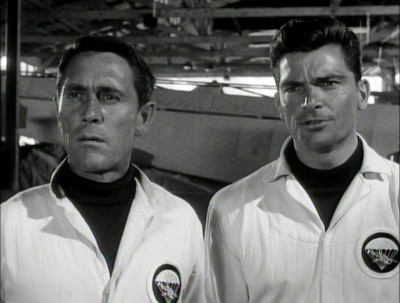
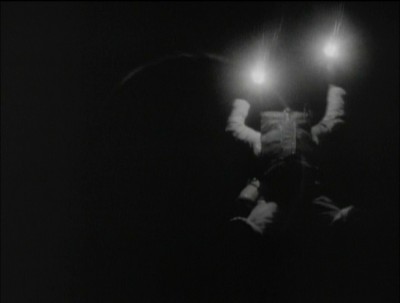
The Video:
Unfortunately, the bit rate is way too low for these transfers. The original materials don't look too bad, but lots of compression jaggies and ghosting doesn't help.
The Audio:
Plenty of hiss for these Dolby Digital English mono audio tracks...but nothing too distracting to the vintage TV collector. No subtitles or closed-captions.
The Extras:
No extras for Ripcord: Complete Season 1.
Final Thoughts:
Pin-point entertainment. Beautifully concise and lean, the little adventures and thrillers and mysteries of Ripcord will please anyone who appreciates small-scale moviemaking that approximates a one-page short story, devoid of fat, which gets the job done without pretense. Men's adventure magazine fodder made palatable for family audiences, Ripcord: Complete Season 1 comes highly recommended.
Paul Mavis is an internationally published movie and television historian, a member of the Online Film Critics Society, and the author of The Espionage Filmography.


|
| Popular Reviews |
| Sponsored Links |
|
|
| Sponsored Links |
|
|
| Release List | Reviews | Shop | Newsletter | Forum | DVD Giveaways | Blu-Ray | Advertise |
|
Copyright 2024 DVDTalk.com All Rights Reserved. Legal Info, Privacy Policy, Terms of Use,
Manage Preferences,
Your Privacy Choices | |||||||









